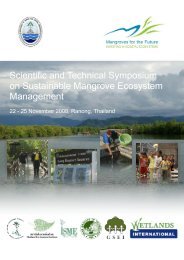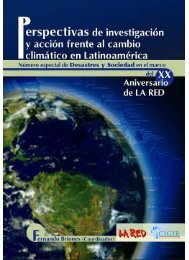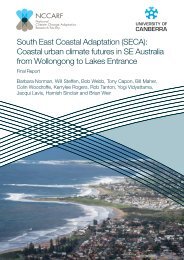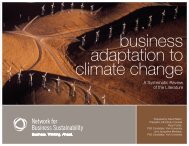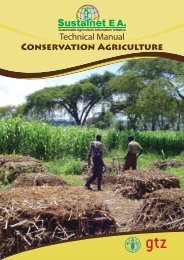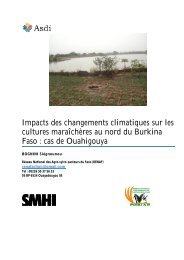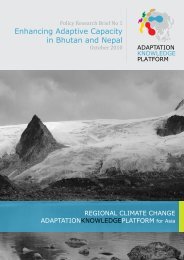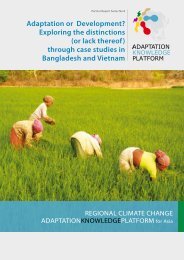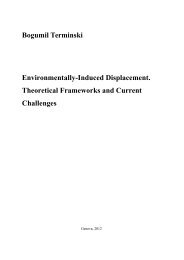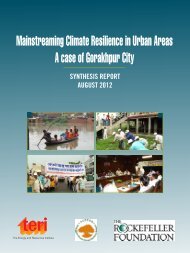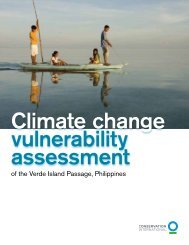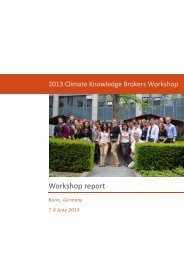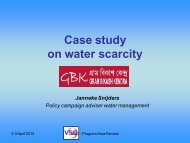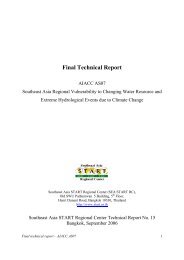ackyard/community gardenernot affiliated3 Food Security: perceptions <strong>and</strong> underst<strong>and</strong>ingThere is broad consensus that one of the major issues confronting society now <strong>and</strong> intothe future is <strong>food</strong> <strong>security</strong> a term now widely used in policy circles (see for exampleLawrence, Lyons <strong>and</strong> Wallington, 2010). In Australia, the Prime Minister’s Science,Engineering <strong>and</strong> Innovation Council (PMSEIC) ‘Expert Working Group’ has drawn uponthe UN Food <strong>and</strong> Agriculture Organisation’s definition, which states that:Food <strong>security</strong> is achieved when all people at all times have physical <strong>and</strong>economic access to sufficient, safe <strong>and</strong> nutritious <strong>food</strong> to meet dietary needs<strong>and</strong> <strong>food</strong> preferences for an active <strong>and</strong> healthy life (PMSEIC, 2010).The underst<strong>and</strong>ing from PMSEIC is that <strong>food</strong> <strong>security</strong> is a phenomenon characterisedby five different but interrelated components, including:Availability ‘sufficient supply of <strong>food</strong> for all people at all times’;Accessibility ‘physical <strong>and</strong> economic access to <strong>food</strong> at all times – equality ofaccess’;Acceptability ‘access to culturally acceptable <strong>food</strong> which is produced <strong>and</strong>obtained in ways that do not compromise people’s dignity, self-respect orhuman rights’;Adequacy – ‘access to <strong>food</strong> that is nutritious, safe <strong>and</strong> produced inenvironmentally sustainable ways’;Stability – ‘reliability of <strong>food</strong> supply’, as influenced for example by <strong>urban</strong> sprawl,continual supply of agricultural inputs, <strong>climate</strong> <strong>change</strong> impacts, <strong>and</strong> ‘weed,disease <strong>and</strong> pest incursions’ (PMSEIC, 2010:9).In this sense, <strong>food</strong> <strong>security</strong>, which was introduced as a concept in the 1970s, refersprimarily to the access, affordability <strong>and</strong> availability of <strong>food</strong> (Patel, 2007). Whiledefinitions of <strong>food</strong> <strong>security</strong> have shifted over time, an emphasis on the market,technological innovation <strong>and</strong> increasing productivity remain as important elements inmost narratives of <strong>food</strong> <strong>security</strong>.However, it is important to note that there is a counter-discourse, which critiques <strong>and</strong>challenges this ‘productivist-technicist’ narrative. This counter-discourse exp<strong>and</strong>s the<strong>food</strong> <strong>security</strong> arguments with concepts <strong>and</strong> terms such as <strong>food</strong> justice, <strong>food</strong> democracy<strong>and</strong> <strong>food</strong> sovereignty. Food sovereignty, for example, was introduced by theinternational farmers’ organisation La Via Campesina in 1996 as a necessary precursorfor <strong>food</strong> <strong>security</strong> (Patel, 2009). While there is a diversity of underst<strong>and</strong>ings, at the heartof <strong>food</strong> sovereignty movements is a ‘rights-based approach’, where people <strong>and</strong>sovereign states have the right to determine their own agricultural <strong>and</strong> <strong>food</strong> policies(McIntyre, et al., 2009). More than simply about access, <strong>food</strong> sovereignty seeks tomake transparent the power relationships inherent in agriculture <strong>and</strong> <strong>food</strong> systems as aprecursor to changing these into more equitable systems.This counter-discourse both engages with the global political-economy of <strong>food</strong>, <strong>and</strong>proposes an alternative of more localised <strong>and</strong> regionalised <strong>food</strong> systems, with a moreeven distribution of ownership of <strong>and</strong> access to productive resources. It also seeks to<strong>Urban</strong> <strong>food</strong> <strong>security</strong>, <strong>urban</strong> <strong>resilience</strong> <strong>and</strong> <strong>climate</strong> <strong>change</strong> 107
shift the focus back to individual <strong>and</strong> community-level health <strong>and</strong> well-being, <strong>and</strong> toinclude questions of environmental sustainability <strong>and</strong> <strong>resilience</strong>.As mentioned earlier, more than half of the world’s population now lives in cities. This<strong>urban</strong> population has, arguably, not only become increasingly disconnected from theorigins of <strong>food</strong>, but is also reliant on an increasingly globalised economy of monetaryex<strong>change</strong> to access <strong>food</strong>. Vulnerabilities are exacerbated when economic resourcesare low, <strong>and</strong> when supplies of <strong>food</strong> grown outside of cities are compromised due toclimatic variability <strong>and</strong> extreme weather events. Feeding growing city populationsrequires transporting <strong>food</strong> from outside its boundaries <strong>and</strong> increasingly from regionsabout which the consumers know very little, although this applies to many goodsconsumed by contemporary city dwellers. Dixon (2011) refers to this disconnectionbetween people <strong>and</strong> the origins of their <strong>food</strong> as a metabolic rift, a disconnection <strong>and</strong>vulnerability that was also highlighted during this project’s fieldwork in Melbourne <strong>and</strong>the Gold Coast.Research undertaken for this project revealed differing perceptions of <strong>food</strong> <strong>security</strong>. Atnational <strong>and</strong> state government levels, <strong>food</strong> <strong>security</strong> is currently treated more as anopportunity rather than a problem. With the underst<strong>and</strong>ing that Australia exports agreat proportion of its agricultural production (roughly two thirds), the challenge ofglobal <strong>food</strong> <strong>security</strong> has been reframed as an opportunity for Australian agri-business<strong>and</strong> manufacturing sectors, to become, as the Prime Minister put it recently, the ‘<strong>food</strong>bowl of Asia’. This view was echoed by the Victorian Government’s Minister forAgriculture <strong>and</strong> Food Security, Peter Walsh, who in May 2012 called on the Victorianfarmers to double <strong>food</strong> production by 2030 in order to meet ‘growing global dem<strong>and</strong> for<strong>food</strong> <strong>and</strong> fibre’. These optimistic <strong>and</strong> opportunistic views reinforce the impression thatat the federal <strong>and</strong> state levels, domestic <strong>food</strong> <strong>security</strong> is not a concern.This attitude by government agencies towards domestic <strong>food</strong> <strong>security</strong> was made clearto the research team by individuals with knowledge of the Victorian Department ofPrimary Industries:[There] is a growing group of traditional economists sitting within the researcharms of DPI, orthodox, economic rationalists. They have a lot of power [<strong>and</strong>] havebeen responsible for poo-poohing concepts like <strong>food</strong> miles, or small farms versusbig farms…They’ve no interest in <strong>urban</strong> agriculture, <strong>and</strong> are going out of theirway to actively disparage it. Any <strong>food</strong> growing that’s not large-scale, commercialproduction oriented to export, is [for them] largely a waste of time [Stategovernment employee, Melbourne].The macro <strong>and</strong> global view to <strong>food</strong> <strong>security</strong> adopted by state governments was sharedby another interviewee who has carried out extensive research on the topic.In [Victoria], [<strong>food</strong> <strong>security</strong>] is talked about in terms of global-level <strong>food</strong> <strong>security</strong>,not state-level <strong>food</strong> <strong>security</strong>. It’s talked about to justify the continuation ofintensive farming in order to ‘feed the world’…It really is purely about [production<strong>and</strong>] supply. It doesn’t include any sustainability elements, it doesn’t include anysocial justice elements, <strong>and</strong> it doesn’t include any community or household-level<strong>food</strong> <strong>security</strong> elements [Academic researcher, Melbourne].Conversely, the semi-autonomous state government agency VicHealth has been asignificant institutional driver for mainstreaming <strong>food</strong> <strong>security</strong> at the policy <strong>and</strong> project<strong>Urban</strong> <strong>food</strong> <strong>security</strong>, <strong>urban</strong> <strong>resilience</strong> <strong>and</strong> <strong>climate</strong> <strong>change</strong> 108
- Page 1 and 2:
Synthesis and Integrative ResearchF
- Page 3 and 4:
Published by the National Climate C
- Page 5 and 6:
ABSTRACTFood security is increasing
- Page 7 and 8:
1. a review of the literature: on n
- Page 9 and 10:
its Food for All project. This help
- Page 13 and 14:
In response to the existential thre
- Page 15 and 16:
2. OBJECTIVES OF THE RESEARCHFood i
- Page 17 and 18:
debates and to the more systematic
- Page 19 and 20:
organisation in the past few years.
- Page 21 and 22:
4. RESULTSIn this section we presen
- Page 23 and 24:
increasing productivity. Thus, whil
- Page 25 and 26:
people and the origins of their foo
- Page 27 and 28:
urban food supply chains. Thus, whi
- Page 29 and 30:
This logistics system is dominated
- Page 31 and 32:
Like Hodgson et al., as per definit
- Page 33 and 34:
esilient, powerful by being locally
- Page 35 and 36:
volume or even its contribution to
- Page 37:
community food growing can have on
- Page 40 and 41:
generations this history has been f
- Page 42 and 43:
a stronger focus on addressing the
- Page 44 and 45:
The third key aspect is fairness -
- Page 46 and 47:
climate (which we live and work in
- Page 48 and 49:
agriculture. Eight percent is in ur
- Page 50 and 51:
This concept of the ‘spaces in be
- Page 52 and 53:
esearch scientist and chair of the
- Page 54 and 55:
As discussed above, protection of t
- Page 56:
4.2.5 What is the extent and the im
- Page 60 and 61:
no place under the panoply of pract
- Page 62 and 63:
increased, the market dominance of
- Page 64 and 65:
… the residents of S Park called
- Page 66 and 67: 5. CONCLUSIONSThere is growing conc
- Page 68 and 69: urban resilience. This inevitably c
- Page 70 and 71: In many respects these contrasting
- Page 72 and 73: Many interviewees of both standpoin
- Page 74 and 75: a given area. The rationale for thi
- Page 76 and 77: mapping the location of sources of
- Page 78 and 79: Australian food policy debates refl
- Page 80 and 81: APPENDIX 1: URBAN FOOD SECURITY, UR
- Page 82 and 83: IntroductionGlobally, and in Austra
- Page 84 and 85: Review methodsThis stage of the res
- Page 86 and 87: despite many of the causes of food
- Page 88 and 89: …by 2050… food production will
- Page 90 and 91: 2. How is food security (in general
- Page 92 and 93: the food security of cities, but no
- Page 94 and 95: While some see the density of devel
- Page 96 and 97: when suppliers, distributors, and c
- Page 98 and 99: a more prominent role in enhancing
- Page 100 and 101: community gardens webpage on the Co
- Page 102 and 103: comprehensive description of the ca
- Page 104 and 105: In both the developed and developin
- Page 106 and 107: Their review notes a significant in
- Page 108 and 109: lines of supply from often rural pl
- Page 110 and 111: 1 IntroductionCities have always be
- Page 112 and 113: Despite some attempts to curb urban
- Page 114 and 115: the Gold Coast remains a city that
- Page 118 and 119: level in local government. VicHealt
- Page 120: Figure 2: Impacts on Municipal Food
- Page 125 and 126: security I recognise that the cost
- Page 127 and 128: United States, he offered the follo
- Page 129 and 130: This vision highlights the multi-fu
- Page 131 and 132: An environmental education centre.
- Page 133 and 134: Melbourne Food ForestA Melbourne ga
- Page 135 and 136: stakeholder consultations, the repo
- Page 137 and 138: can. We sense the changes. The earl
- Page 139 and 140: half-desert environments. We’re g
- Page 141 and 142: etain its basic function and struct
- Page 143 and 144: government; and that trying to get
- Page 145 and 146: the north and the west, where it wo
- Page 147 and 148: Why do people buy so much food that
- Page 149 and 150: urban agriculture (however broadly
- Page 151 and 152: enefits and risks. Before we can co
- Page 153 and 154: Another important and tangible role
- Page 155 and 156: coast without any problems whatsoev
- Page 157 and 158: BIBLIOGRAPHYAECOM (2011) Scoping St
- Page 159 and 160: Burns, C. I., A. (2007). Measuring
- Page 161 and 162: Edwards, F., & Mercer, D. (2010). M
- Page 163 and 164: James, S. O’Neill, P. and Dimeski
- Page 165 and 166: Millar, R., 2012, ‘Government shi
- Page 167 and 168:
Saltmarsh, N. M., J; Longhurst, N.
- Page 169 and 170:
Walker B., 2008, Resilience Thinkin



